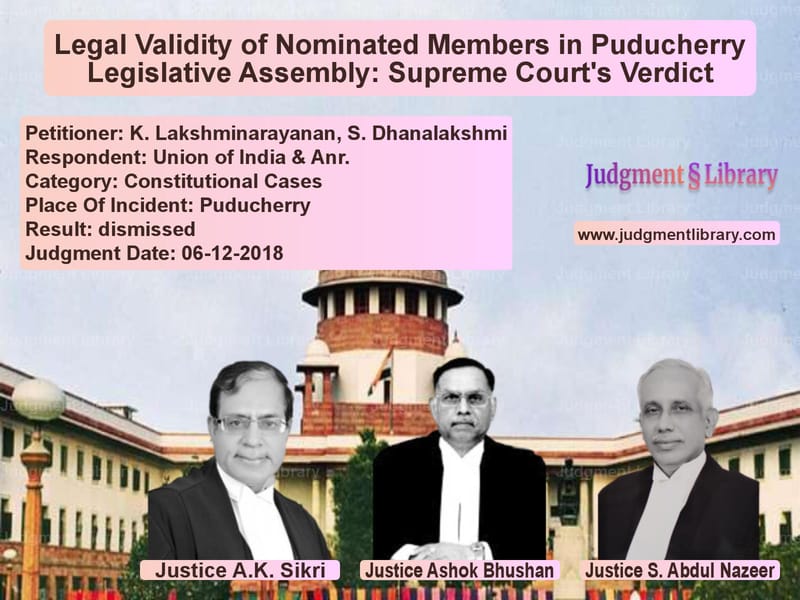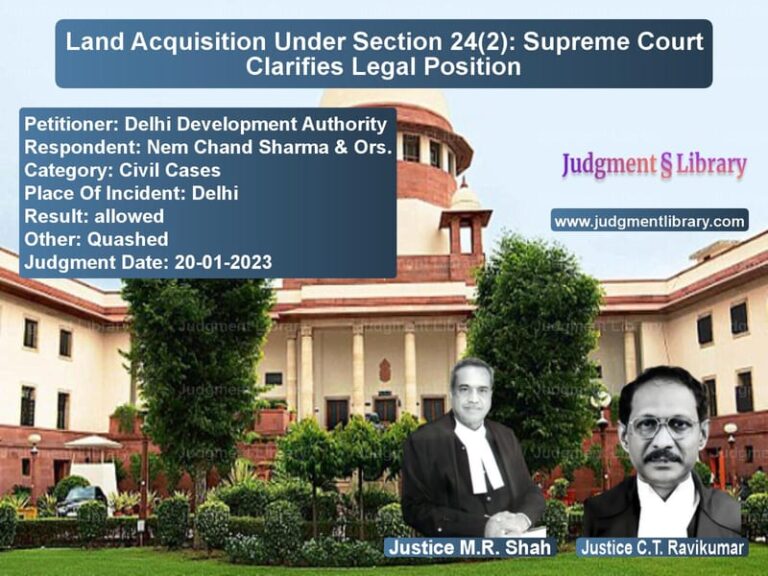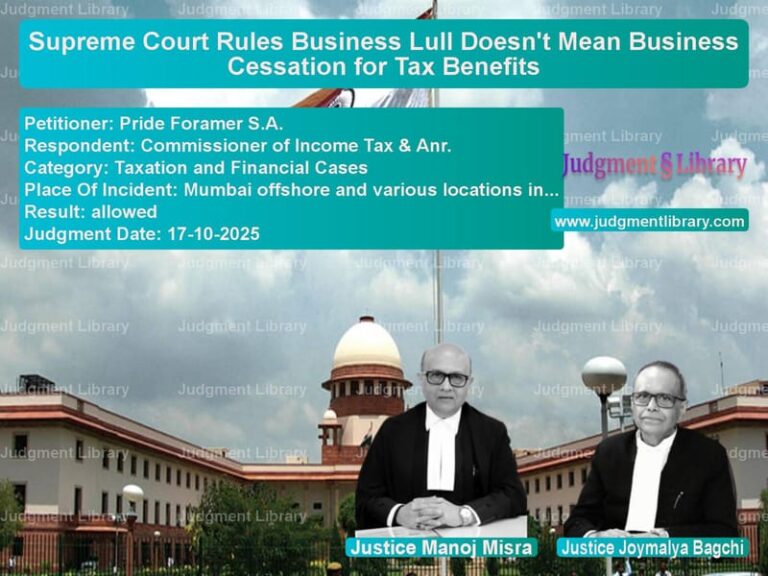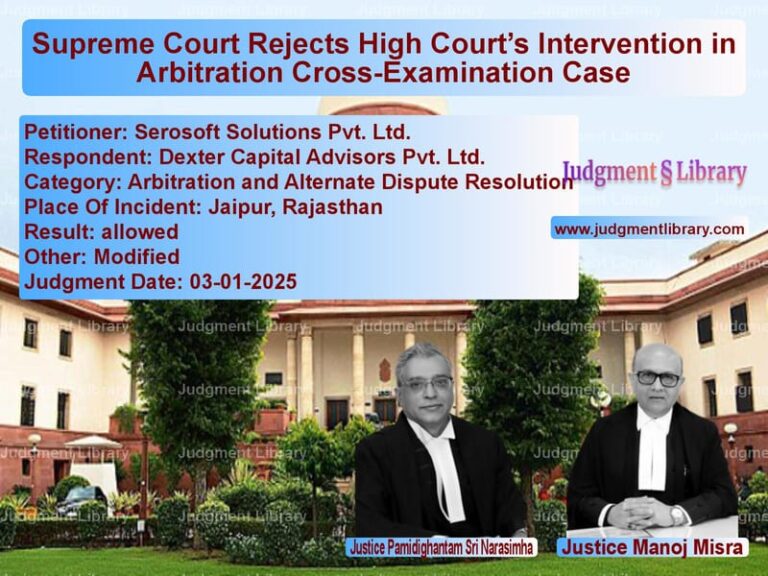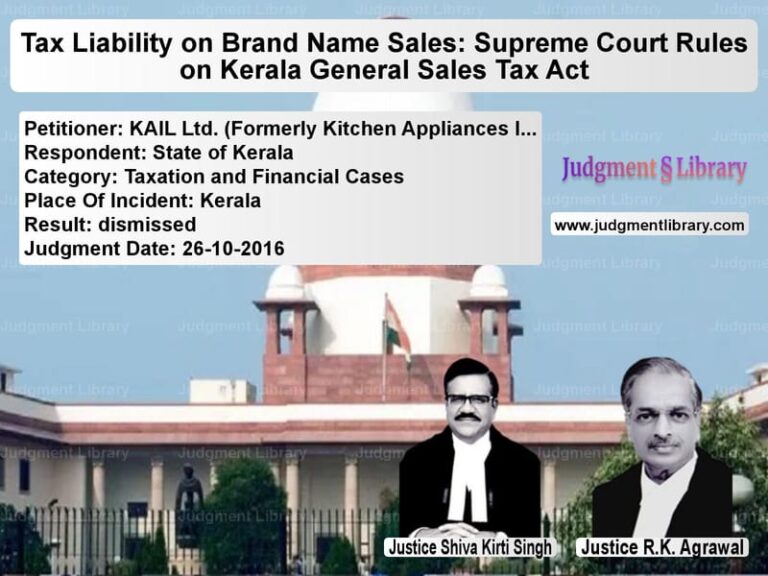Legal Validity of Nominated Members in Puducherry Legislative Assembly: Supreme Court’s Verdict
The case of K. Lakshminarayanan v. Union of India and S. Dhanalakshmi v. Union of India is a landmark ruling on the nomination of members to the Puducherry Legislative Assembly by the Central Government. The key question in this case was whether the nomination of members by the Central Government, without consultation with the elected government, violated the principles of cooperative federalism and constitutional conventions.
The matter reached the Supreme Court after the Madras High Court upheld the nominations, leading the petitioners to challenge the decision. The petitioners argued that the nominations should be made in consultation with the elected Chief Minister, whereas the Central Government maintained that no such requirement existed under the law.
Background of the Case
The dispute originated from the nomination of three members to the Puducherry Legislative Assembly by the Central Government. The key facts leading to the case were:
- The nominations were made under Section 3(3) of the Government of Union Territories Act, 1963.
- The nominated members were appointed directly by the Central Government without consulting the Chief Minister of Puducherry.
- The petitioners challenged the nominations, arguing that previous practice and constitutional convention required consultation.
- The Madras High Court upheld the nominations, leading to an appeal in the Supreme Court.
Legal Issues Considered
The Supreme Court addressed several crucial questions in this case:
- Does Section 3(3) of the Government of Union Territories Act, 1963, mandate consultation with the Chief Minister before nominating members?
- Does the absence of consultation violate the principles of cooperative federalism?
- Was there an established constitutional convention requiring consultation?
- Do nominated members have full voting rights in the Legislative Assembly?
Arguments Presented
Petitioners’ Arguments
Senior Counsel Kapil Sibal, appearing for the petitioners, contended:
“The nominations must originate from the Government of Puducherry and should have the concurrence of the Chief Minister. The unilateral appointment of members by the Central Government violates the basic structure of democracy.”
He further argued that previous nominations had always been made after consulting the elected government, forming a constitutional convention that should be followed.
Respondents’ Arguments
The Attorney General, representing the Union of India, countered:
“The Union Territory is administered by the Central Government, and there is no legal requirement for consultation with the Chief Minister. The power of nomination is vested solely in the Central Government.”
He further asserted that cooperative federalism does not necessitate consultation in this matter and that previous instances of consultation were not legally binding conventions.
Supreme Court’s Observations and Judgment
The Supreme Court, comprising A.K. Sikri, Ashok Bhushan, and S. Abdul Nazeer, upheld the nominations and ruled that the Central Government had the authority to nominate members without requiring consultation with the elected government of Puducherry. The Court held:
“The power of nomination under Section 3(3) of the Act, 1963, is vested in the Central Government, and there is no legal mandate that the nomination should be made only with the concurrence of the elected Chief Minister.”
The Court rejected the argument that a constitutional convention existed requiring consultation before nominations. It observed that while consultation had taken place in some cases, it was not a binding requirement.
Voting Rights of Nominated Members
Another major issue in this case was whether the nominated members had full voting rights in the Assembly, including on matters like the budget and no-confidence motions. The Court ruled:
“Section 12 of the Act, 1963, does not exclude nominated members from voting on any matter in the Assembly. The legislative intent is clear that nominated members have full rights akin to elected members.”
This ruling affirmed that nominated members could participate in all Assembly proceedings, countering arguments that their voting rights should be limited.
Implications of the Judgment
The Supreme Court’s decision has significant implications:
- It reaffirms the authority of the Central Government in administering Union Territories.
- It clarifies that cooperative federalism does not impose a legal obligation for consultation in nominations.
- It upholds the equal voting rights of nominated members in Union Territory legislatures.
Conclusion
This judgment is a crucial precedent in interpreting the powers of the Central Government in Union Territories. It affirms that the Central Government has the exclusive right to nominate members to the Puducherry Legislative Assembly and that nominated members possess full voting rights.
Final Verdict: The appeal was dismissed, and the nominations were upheld.
Petitioner Name: K. Lakshminarayanan, S. Dhanalakshmi.Respondent Name: Union of India & Anr..Judgment By: Justice A.K. Sikri, Justice Ashok Bhushan, Justice S. Abdul Nazeer.Place Of Incident: Puducherry.Judgment Date: 06-12-2018.
Don’t miss out on the full details! Download the complete judgment in PDF format below and gain valuable insights instantly!
Download Judgment: K. Lakshminarayanan, vs Union of India & Anr Supreme Court of India Judgment Dated 06-12-2018.pdf
Direct Downlaod Judgment: Direct downlaod this Judgment
See all petitions in Fundamental Rights
See all petitions in Constitution Interpretation
See all petitions in Legislative Powers
See all petitions in Judgment by A.K. Sikri
See all petitions in Judgment by Ashok Bhushan
See all petitions in Judgment by S. Abdul Nazeer
See all petitions in dismissed
See all petitions in supreme court of India judgments December 2018
See all petitions in 2018 judgments
See all posts in Constitutional Cases Category
See all allowed petitions in Constitutional Cases Category
See all Dismissed petitions in Constitutional Cases Category
See all partially allowed petitions in Constitutional Cases Category

